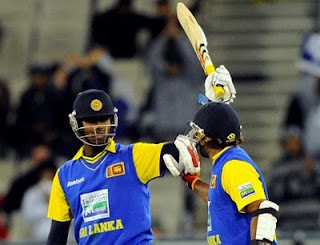Sri Lanka's captain Tillakaratne Dilshan struck a compelling century then marshalled his team neatly in the field to secure a 35-run victory over Australia in the first Twenty20 international in Kandy.
Sent in to bat at the Pallekele International Cricket Stadium, the hosts were headed for a total of about 150 before Dilshan (104, 57 balls, 12 fours, five sixes) and the allrounder Jeevan Mendis (29, 19 balls) combined for a stand of 104 runs in a mere 45 balls to lift the hosts to 198 for 3. Dilshan hammered 67 from his final 23 deliveries, a sequence that effectively decided the match.
The Australians' chase was undone by the flat offspin of the debutant Dilruwan Perera (3-26), who provided a reminder there is plenty of slow bowling depth for the Sri Lankans to utilise across the limited overs and Test series to take place through August and September. Rangana Herath (1-11) also posed plenty of problems, much as he had done on his debut against the Australians on their 1999 visit to the island.
Dilshan's was exactly the kind of opening statement a captain desires to make, providing plenty of evidence the Australians will be up against a feisty opponent on this tour. They will also need to sharpen their fielding, as fumbles were a recurring theme of the team's first international since a limited overs series in Bangladesh in April.
Mitchell Johnson, John Hastings and Shane Watson were all taken for more than 11 runs per over, while curiously the spin of Steve O'Keefe and Steve Smith was not fully utilised despite offering a greater level of economy than any of the faster men.
By contrast the Sri Lankans employed three spin bowlers in their defence of the target, and in truth no-one other than the belligerent David Warner (53) ever looked comfortable enough to impose serious pressure on the home attack.
Needing 10 runs an over virtually from the start, Australia's reply was inconvenienced by the early swing of Nuwan Kulasekara (2-39), who found a way through Watson in the third over. Warner was soon finding the boundary, and on one occasion cleared it with a line drive over the bowler's head.
Shaun Marsh was less settled, and misread the first over from the debutant Perera to be lbw for four. David Hussey appeared fortunate that no-one on the field was fully alert to an apparent thin edge behind off the bowling of Dhammika Prasad, but next over he was nowhere near a sharp off break from Perera that tilted middle stump.
Cameron White managed only one boundary before he too was defeated by a Perera offbreak that straightened from around the wicket, and at 63 for 4 Australia's chase was looking decidedly sick. It deteriorated further when Steven Smith was utterly confused by Herath and stumped, while Dilshan had the luxury of dropping Warner then being able to accept another chance. O'Keefe and Johnson provided nuisance value, but by then the equation would have been too steep even for Dilshan.
Brett Lee had shared the new ball with the left-arm spinner O'Keefe in a nod to a surface that offered some bounce but also turn. Mahela Jayawardene managed a pair of crisp boundaries to long-on and backward point, but in the third over squirted a Lee yorker into his stumps.
Dilshan immediately took the attack to Lee, following a top-edged hook for six with an artful glide through gully for four, meaning the over reaped 14 runs as well as a wicket. He then sought to unsettle Johnson with a series of impudent gestures. Dinesh Chandimal also made a bright start, but on 11 was hurried onto the back foot by Johnson's pace and slid ungracefully into his wicket - only the fifth such dismissal in T20 internationals, its rarity underlined by the bowler's miffed reaction.
Tensions were evident between Dilshan and Watson, the Australian firing a return throw towards the batsman, who fended it away with a glove. A curious appeal by the Australians posed the question about obstruction, as the game's laws have been changed to disallow any by a batsman out of his crease, but the umpires waved it away.
Kumar Sangakkara cracked boundaries over mid-off and square leg to raise a 50 stand with Dilshan, but the next over he flicked ineffectually at a Watson slower ball and handed a simple catch to Cameron White. Mendis announced himself with a reverse-swept boundary from the bowling of Smith, then gave a passing impression of no less a left-hander than Sangakkara himself with a pull shot of some flourish when Watson dropped fractionally short.
John Hastings' slower balls were losing their novelty, and Dilshan took a heavy toll by swinging thrice to the legside for boundaries either side of an exceptionally cheeky reverse-dab past short third man - the over was worth 20.
Mendis and Dilshan tormented the Australians in the closing overs, piling up 67 runs from overs 15-18 to turn a middling total into an intimidating one. Too often the touring bowlers missed the yorker length, and when they did strike it Dilshan's wrists were supple enough to send the ball skidding through gully to the rope.
On 84 when the final over began, Dilshan cracked a pair of sixes then mis-scooped a boundary to go to three figures, before adding another to take the Sri Lankans to the cusp of 200 - a total they would not have contemplated at 94-3. Australia's bowlers, and batsmen, have the task ahead of them.
SOURCE : ESPNCRICINFO










.jpg)












